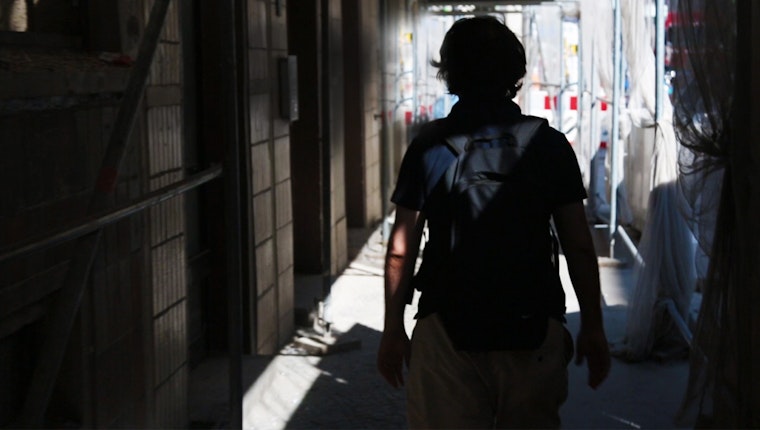Azerbaijan’s Wrong Turn
By Melina Milazzo

On May 30, 2017, Leyla Mustafayeva awoke alone. Her husband, Afgan Mukhtarli, had been out with friends the night before and never came home. She called his friends, who said that Mukhtarli had left them around 7 p.m. the night before. Mustafayeva started to “fear the worst.”
Mukhtarli and Mustafayeva, a married couple, both working as journalists, spent four years reporting on the Azerbaijan government’s rampant corruption and human rights abuses. A shared fear of harassment and imprisonment compelled them to flee to Georgia in 2015, but the respite proved all too brief.
Two days after he first went missing, Mukhtarli reappeared in Azerbaijan custody on spurious charges of illegally crossing the border, using force against border guards, and smuggling money into the country. He alleges that Georgian-speaking men in police uniforms kidnapped him, beat him, and handed him off at the border to Azerbaijani officials, who then planted €10,000 on him. He was in pretrial detention on May 31, and he’s remained there ever since.
Mukhtarli’s abduction set a new precedent in how far Azerbaijani authorities were willing to go to persecute dissident expats living in Georgia. There are also outstanding questions about what role, if any, the Georgian government played in Mukhtarli’s kidnapping, as well as in the overall deteriorating situation Azerbaijani dissidents in the country are now facing.
In July 2017, Freedom Now and the International Partnership for Human Rights traveled to Tbilisi to document the cases of Azerbaijani exiles living in Georgia. Together with the Tbilisi-based Human Rights Education and Monitoring Center, the three organizations issued a report to the Georgian government and its international partners—the European Union, Council of Europe, and United Nations—with their analysis, findings, and recommendations.
Taken altogether, the report documents the lengths the government of Azerbaijan will go to silence dissent, and serves as a sobering reminder that the international community must take bolder action in addressing Azerbaijan’s human rights abuses.
Azerbaijani leaders have a long history of silencing their critics. But in recent years, the crackdown on independent journalists and civil society has intensified. Azerbaijan is reported to have at least 130 political prisoners, and the government recently blocked Meydan TV, an independent news site (which both Mukhtarli and Mustafayeva have written for previously). Recently, the Turan Information Agency, the last independent news outlet in the country, was also shut down.

Georgia, known for being a regional leader when it comes to respect for human rights and independent civil society, has been a safe haven for many Azerbaijani journalists and activists fleeing from persecution back home. But Mukhtarli’s case, along with other incidents of harassment and threats against Azerbaijani exiles in Georgia, has called Georgia’s reputation as a rights-respecting democracy into question.
Azerbaijani dissidents, journalists, and political activists living in Georgia have reported being harassed, threatened, and even attacked by men they presume are agents of the Azerbaijan government. Despite reporting these incidents to Georgian authorities, not one case involving Azerbaijani exiles has resulted in the identification—let alone the arrest—of the perpetrator.
In Mukhtarli’s case, the very agency accused of being involved in his kidnapping, the Ministry of Internal Affairs, was also initially charged with carrying out his investigation. It was only after domestic and international pressure were applied that his case was transferred to the prosecutor’s office. Nevertheless, Mukhtarli and his wife are not being informed about the investigation; they have no idea whether any progress has been made.
Making matters worse, Georgian authorities are reportedly denying Azerbaijani exiles residence permits and asylum claims on vaguely defined grounds of state security and public order. In one case, Azerbaijani opposition activist Dashgin Aghalarli and his son were refused asylum on “state security and public order grounds” even though the decision noted that Aghalarli would likely face persecution at home.
Georgia also appears to be selectively denying Azerbaijani activists entry into Georgia. Azerbaijanis made up more than half of all individuals denied entry into Georgia on state security grounds in 2016 and part of 2017, according to official statistics. Those known for publicly criticizing the Azerbaijani government have been especially singled out.
The Georgian government must ensure that effective and independent investigations— including the claims made by Mukhtarli regarding Georgian officials’ alleged involvement in his abduction—are promptly carried out. The government must also do more to bring its asylum and residence permit policies into line with its commitments under international law.
Georgian authorities, moreover, must protect to the maximum extent possible the physical safety of Azerbaijan exiles residing in Georgia and promote an environment where they can live and work freely and without harassment.
Freedom Now is a grantee of the Open Society Foundations.
Read the complete report on Azerbaijan’s efforts to silence dissidents living in exile.
Melina Milazzo is the Washington, D.C., director of Freedom Now.